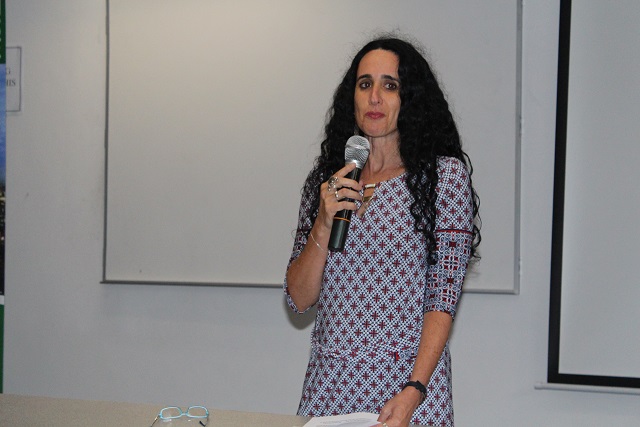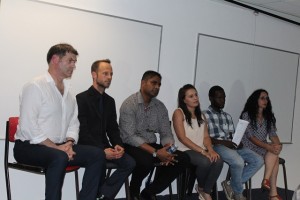Looking at alternative approaches to drug use disorders was the aim behind the public lecture: Let’s talk about drug solutions, and stop the harm!, that was held by the Urban Futures Centre (UFC), in partnership with the TB/HIV Care Association, at the Durban University of Technology (DUT) on Wednesday, 28 February 2017. The intent of the lecture was to also find solutions to reduce harm caused by drugs and the way laws are enforced in our city.
The event featured talks by Prof Monique Marks (DUT), Shaun Shelly (THCA), and Dr Andrew Scheibe (THCA/DUT), as well as eThekwini and community representatives on Opioid Substitute Therapy (OST).
Welcoming guests to the lecture was Prof Marks from the UFC who spoke about Whoonga use which is very common in the city and how new drugs continued to become more available, despite efforts by police, communities-tough love, zero tolerance and the war on drugs.
“We need to be able to talk about the use of drugs by ourselves and our family members without the fear of being shamed or marginalised. As parents, we encourage our children to talk to us about things that are worrying them. Yet the current prohibitions and moralistic reactions to drug use make it hard for our children to speak to us openly about drug use and makes it difficult for us as family members to seek support,” she said.
Prof Marks also added that the war against drugs had not worked but pushed drug use and dealing further underground, dispersed the community, and created new drug markets.
“What we are seeking as a research innovation centre at a University are alternate solutions to problematic drug use-ones that reduce the harms associated with drugs rather than reinforcing and intensifying them. After a very long process of planning and lobbying, we begin South Africa’s first Opioid Substitute Therapy (OST) Programme in South Africa. This is literally the substitution of heroin for a legal medication that allows for mood stabilisation in much the same way as heroin does but without the euphoric effect,” she stressed.
Also, giving more insight on drug users was Drug Policy Advocate Specialist Shaun Shelley, who said that the lecture was a great platform to promote and share ideas around harm reduction drug policies. He spoke about the new drug craze called Bluetooth which is the trend of sharing blood between Whoonga users in an attempt at getting high and hailed as a health crisis that can increase the chances of transmission of HIV, hepatitis and other blood disease infections.
Shelley is committed to furthering the understanding and treatment of addiction, as well as advocating for changes to drug policies at local and national level. He explained that in South Africa, drug use is criminalised and often incorrectly blamed for an array of social ills, and is a simplistic, conventional wisdom that doesn’t give due consideration to the multiple and complex drivers of poverty, crime, and drug use itself. “This misunderstanding of drug use has led to high levels of stigmatisation and exclusion. Drug users in South Africa must be seen as people who deserve the same rights as everyone else,” he said.
According to Dr Scheibe, who also spoke at the lecture, he gave a statistical presentation on Opioid Substitution Therapy (OST) as part of a drug solution and countries that are implementing needle and syringe programmes like Mauritius and Tanzania. “The war on drugs and zero tolerance has not reduced availability or use of heroin in Africa. The World Health Organisation and other global bodies recommended OST, so what are we waiting for,” he stressed.
Prof Marks also added that in April this year, 2017, DUT together with TB/HIV Care will be launching an OST Demonstration project which will be providing methadone to 50 low income heroin users (mostly Whoonga users) over an 18 month period. “This will be done following best international practice and will be guided by a very detailed protocol which has been approved by both the Department of Health and DUT ethics. It is a non-government project and we also have a good working relationship with government, the eThekwini municipality and will be working closely with the King Edward Hospital in this project.”
She also reiterated that while law and policy mattered a lot, the provision of local services mattered more on a daily basis. We cannot wait for policy change to begin with the project processes that are ultimately about humanitarian needs.”
Prof Marks hopes to continue working closely with government, NGOs and the police for the purpose of allowing drug users to come at one place of safety and for the reason of using drugs in a safe environment.
Pictured: Prof Marks, speaking at the public lecture.
Pictured: Prof Monique Marks (DUT), Shaun Shelly (THCA), and Dr Andrew Scheibe (THCA/DUT), as well as eThekwini and community representatives on OST, at the event.
– Waheeda Peters



